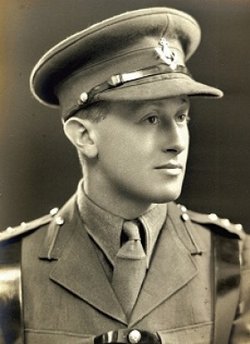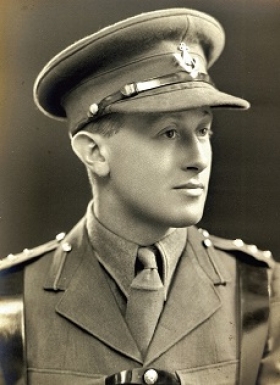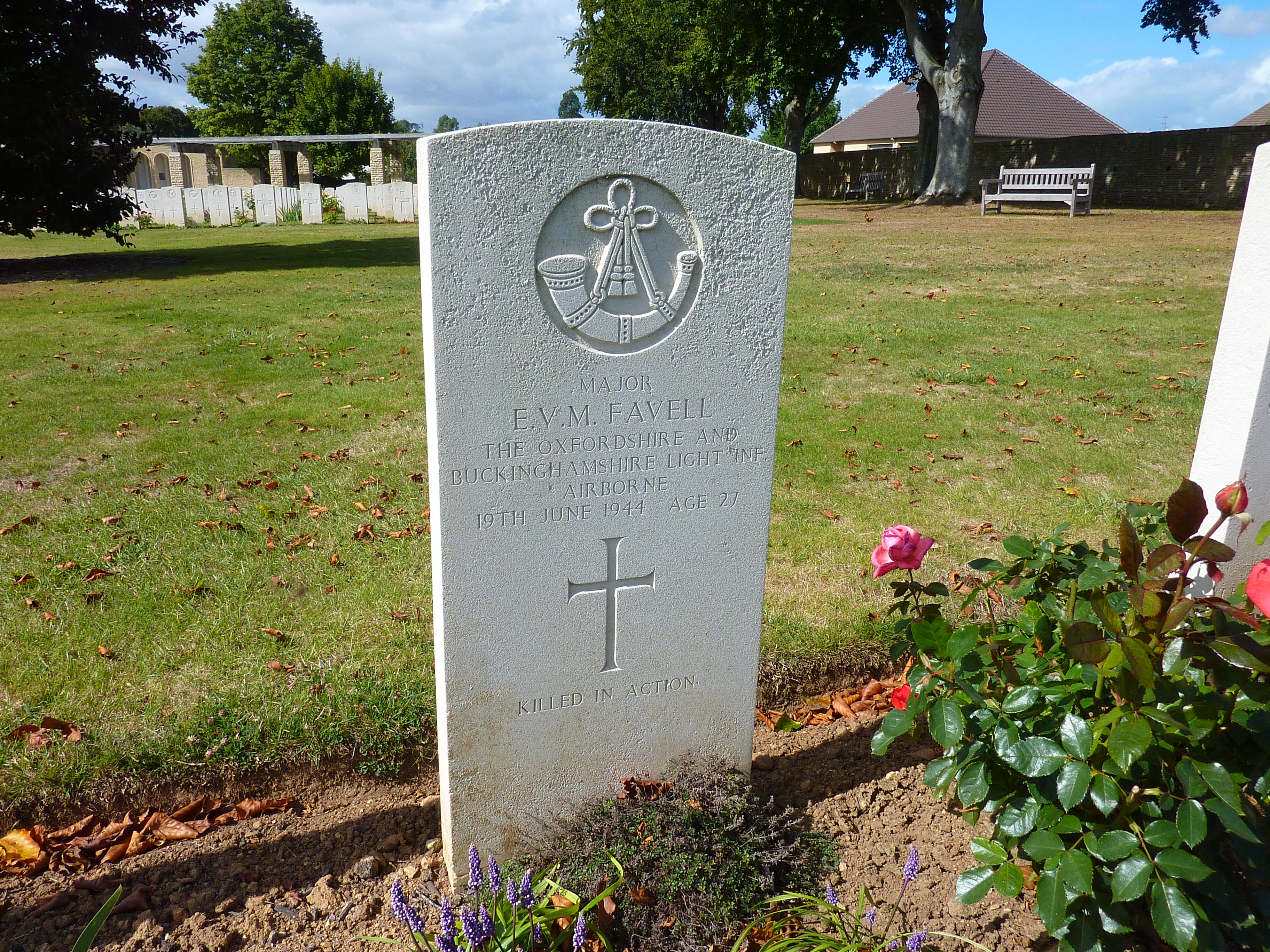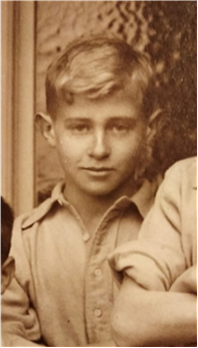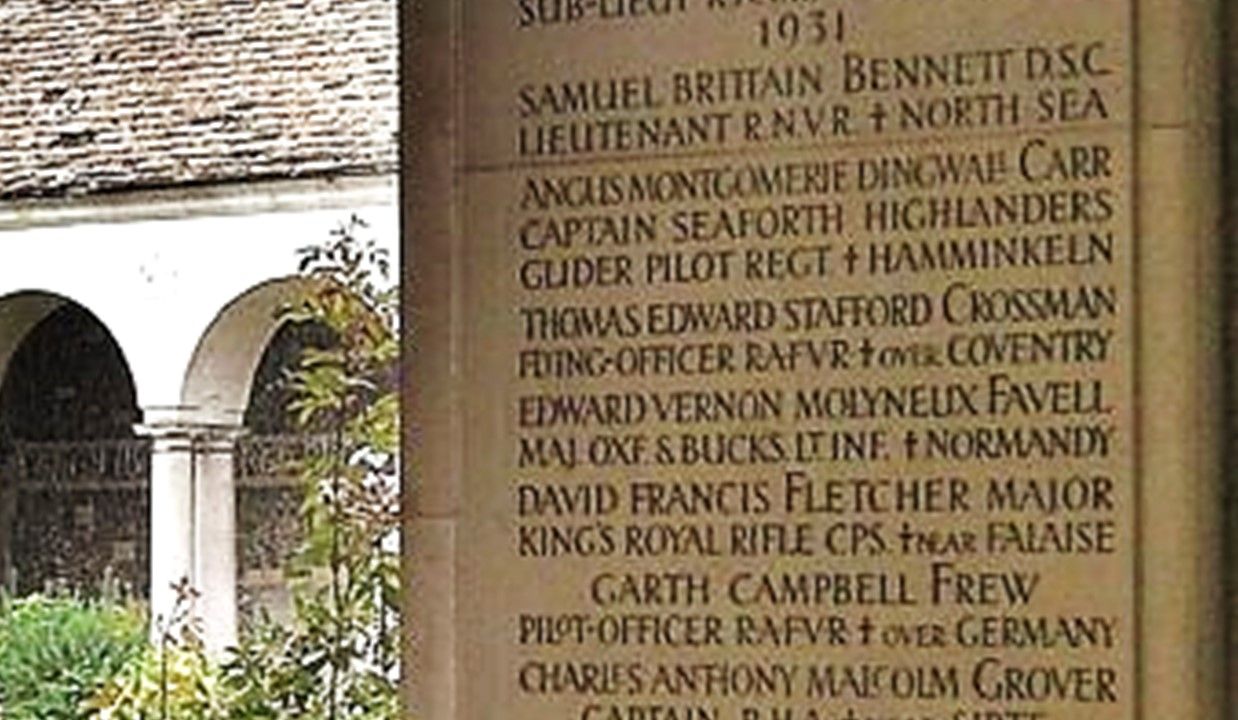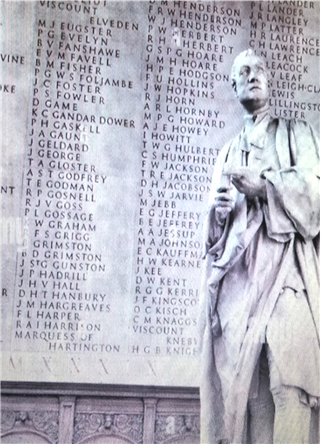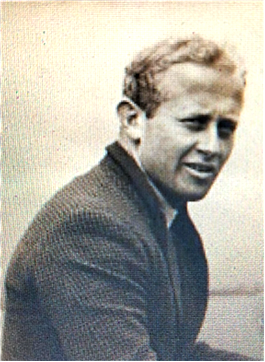Service Number: 75263
Regiment: Oxford and Bucks Light Infantry 2nd (Airborne) Battalion.
Died: 19th June 1944
Age: 27 years old
Teddy was the younger son of Richard Vernon Favell and Alice Molyneux Favell (née Cohan), of Penberth, Cornwall. They had married in 1910. After serving as a Major in the Great War in the Royal Army Medical Corps, Dr Favell settled in Sheffield where he was a well-respected physician. Teddy was born on the 16th November 1917 in Sheffield. He had a twin sister Margaret, an older brother Richard and a younger sister Mary.
His mother, Alice and her sisters had visited Penberth Cove in the south west of Cornwall as children. In late 1918, even before his father had returned from the war, his mother had started acquiring property and land around Penberth. In December 1918 she purchased the family home named 'Foxstones' (now re-named Penberth House). Much work needed to be done on the house but after Richard Favell returned from the war, the family decided to move from Sheffield to Penberth in the Autumn of 1920. By 1933 the Favell family holdings in and around Penberth amounted to some 300 acres with a number of farm houses and buildings in the Penberth Valley and nearby village of Treen. Teddy suffered from asthma so the Cornish climate would have suited him better than Sheffield. His father served as High Sheriff of Cornwall in 1933. He died, suddenly, at his home in Penberth on the 4th February 1936, aged fifty five.
Teddy was educated at Lockers Park Preparatory School in Hertfordshire before going on to Winchester College in May 1931. At Winchester he was a Prefect, excelled at running and rowing and for gymnastics was awarded a Bronze Medal. The College record states: "Teddy was loved by his friends for his childlike charm and simplicity of character, qualities that derive in part from his devotion to the country and its' simple pleasures; dogs, sailing a boat and fishing. The rocks in his beautiful home in Cornwall were a never- failing source of joy to him. He faced life trustfully and serenely".
In May 1936 Teddy left Winchester College and travelled to Germany and France in order to learn the languages. Returning to England in October he entered Trinity College Cambridge where he studied for the next three years.
Graduating in May 1939, Teddy was gazetted as a Lieutenant in the Oxford and Bucks Light Infantry in the June. He was posted to India with the 8th Battalion before returning to England in 1943, and volunteering for the Airborne Forces. After successfully completing glider training Teddy was posted as Officer Commanding Support Company, 2nd (Airborne) Battalion, Oxford and Bucks Light Infantry, part of the 6th Air Landing Brigade. Taking part in Operation Overlord (Normandy), this unit led the airborne assault on the Normandy beaches on D-Day.
Teddy's Battalion took off in gliders on the night of the 5th June 1944, their mission being to "capture and hold until relieved two important bridges". These bridges were on the flanks of the Canadian and British landing beaches. One was the bridge at Benouville which crossed the Caen Canal between Caen and Ouistreham (now known as "Pegasus Bridge"). The other was the bridge over the River Orne at Ranville (now known as "Horsa Bridge"). The object was to prevent German armour crossing the bridges and attacking the eastern flank of the landings on Sword Beach.
Having landed close to their objectives, the bridges were secured within 10 minutes of landing. They suffered only two casualties. They were reinforced at 0300hrs on the 6th June by the 7th Battalion, Parachute Regiment led by Lord Lovat's Commandos as they were linked up with the beach landing forces.
There followed two weeks of very heavy fighting in the Battle for Normandy. Teddy was killed in action, early on the 20th June 1944, at Chateau St. Come. During an attack on a wood near Breville, No. 2 Company Commander, Major Edmunds was wounded by mortar fire. Teddy was ordered to take over command. When going round his men to introduce himself, he too was hit by mortar fire and killed instantly. He was twenty-seven years old.
Teddy was initially given a field burial at Breville but was re-interred in Ranville War Cemetery on the 2nd July 1945. He is also commemorated in the following locations:
On a pew end in St Levan Church commissioned by his widowed mother.
On War Memorials at St Buryan Church, Winchester College, and Trinity College, Cambridge.
Teddy's older brother Richard also served in the war. He was Commander Richard Favell, D.S.C., R.N. A submarine ace, he survived the war. Richard died in 1995.
(Sources: CWGC, Ancestry, Winchester College, Trinity College, Publication: The Flavells of Penberth, Find a Grave Contributor: CJM (51355127), Paradata, Newspaper Archives)
(Bio: Woose)
Service Number: 75263
Regiment: Oxford and Bucks Light Infantry 2nd (Airborne) Battalion.
Died: 19th June 1944
Age: 27 years old
Teddy was the younger son of Richard Vernon Favell and Alice Molyneux Favell (née Cohan), of Penberth, Cornwall. They had married in 1910. After serving as a Major in the Great War in the Royal Army Medical Corps, Dr Favell settled in Sheffield where he was a well-respected physician. Teddy was born on the 16th November 1917 in Sheffield. He had a twin sister Margaret, an older brother Richard and a younger sister Mary.
His mother, Alice and her sisters had visited Penberth Cove in the south west of Cornwall as children. In late 1918, even before his father had returned from the war, his mother had started acquiring property and land around Penberth. In December 1918 she purchased the family home named 'Foxstones' (now re-named Penberth House). Much work needed to be done on the house but after Richard Favell returned from the war, the family decided to move from Sheffield to Penberth in the Autumn of 1920. By 1933 the Favell family holdings in and around Penberth amounted to some 300 acres with a number of farm houses and buildings in the Penberth Valley and nearby village of Treen. Teddy suffered from asthma so the Cornish climate would have suited him better than Sheffield. His father served as High Sheriff of Cornwall in 1933. He died, suddenly, at his home in Penberth on the 4th February 1936, aged fifty five.
Teddy was educated at Lockers Park Preparatory School in Hertfordshire before going on to Winchester College in May 1931. At Winchester he was a Prefect, excelled at running and rowing and for gymnastics was awarded a Bronze Medal. The College record states: "Teddy was loved by his friends for his childlike charm and simplicity of character, qualities that derive in part from his devotion to the country and its' simple pleasures; dogs, sailing a boat and fishing. The rocks in his beautiful home in Cornwall were a never- failing source of joy to him. He faced life trustfully and serenely".
In May 1936 Teddy left Winchester College and travelled to Germany and France in order to learn the languages. Returning to England in October he entered Trinity College Cambridge where he studied for the next three years.
Graduating in May 1939, Teddy was gazetted as a Lieutenant in the Oxford and Bucks Light Infantry in the June. He was posted to India with the 8th Battalion before returning to England in 1943, and volunteering for the Airborne Forces. After successfully completing glider training Teddy was posted as Officer Commanding Support Company, 2nd (Airborne) Battalion, Oxford and Bucks Light Infantry, part of the 6th Air Landing Brigade. Taking part in Operation Overlord (Normandy), this unit led the airborne assault on the Normandy beaches on D-Day.
Teddy's Battalion took off in gliders on the night of the 5th June 1944, their mission being to "capture and hold until relieved two important bridges". These bridges were on the flanks of the Canadian and British landing beaches. One was the bridge at Benouville which crossed the Caen Canal between Caen and Ouistreham (now known as "Pegasus Bridge"). The other was the bridge over the River Orne at Ranville (now known as "Horsa Bridge"). The object was to prevent German armour crossing the bridges and attacking the eastern flank of the landings on Sword Beach.
Having landed close to their objectives, the bridges were secured within 10 minutes of landing. They suffered only two casualties. They were reinforced at 0300hrs on the 6th June by the 7th Battalion, Parachute Regiment led by Lord Lovat's Commandos as they were linked up with the beach landing forces.
There followed two weeks of very heavy fighting in the Battle for Normandy. Teddy was killed in action, early on the 20th June 1944, at Chateau St. Come. During an attack on a wood near Breville, No. 2 Company Commander, Major Edmunds was wounded by mortar fire. Teddy was ordered to take over command. When going round his men to introduce himself, he too was hit by mortar fire and killed instantly. He was twenty-seven years old.
Teddy was initially given a field burial at Breville but was re-interred in Ranville War Cemetery on the 2nd July 1945. He is also commemorated in the following locations:
On a pew end in St Levan Church commissioned by his widowed mother.
On War Memorials at St Buryan Church, Winchester College, and Trinity College, Cambridge.
Teddy's older brother Richard also served in the war. He was Commander Richard Favell, D.S.C., R.N. A submarine ace, he survived the war. Richard died in 1995.
(Sources: CWGC, Ancestry, Winchester College, Trinity College, Publication: The Flavells of Penberth, Find a Grave Contributor: CJM (51355127), Paradata, Newspaper Archives)
(Bio: Woose)
Inscription
KILLED IN ACTION
Sponsored by Ancestry
Advertisement
Advertisement
